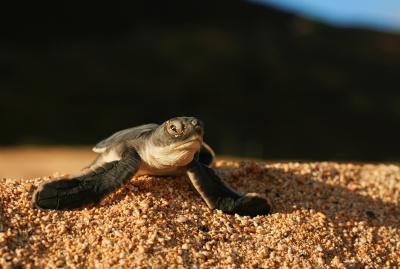Dr Jonathan Blount, who led the research, said: "We believe this is the first time that adaptation to local environmental conditions has been demonstrated in sea turtles, which is all the more remarkable because the beaches in question are just six kilometres apart".
Heat-tolerant populations may be crucial in allowing species to adapt to a warming world, highlighting the need for conservation strategies which protect diversity in animal populations.
University of Exeter PhD student Dr Sam Weber, lead author of the study, said: "Such adaptations probably evolve over many generations, so whether turtle evolution can keep pace with the rapid climate change that scientists have predicted remains to be seen. However, occasional movements of heat-adapted turtles to other nesting sites could help to spread their favourable genes."

This video shows a green turtle laying eggs on Ascension Island.
(Photo Credit: Mark Orr (Cayman Islands Department of Environment).)

This is a green turtle hatchling on Ascension Island.
(Photo Credit: Dr Sam Weber, University of Exeter)
Source: University of Exeter